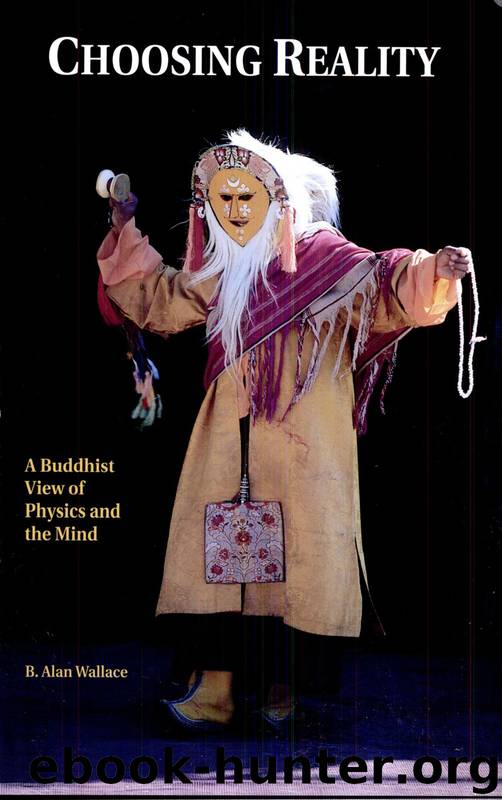Choosing Reality, : A Buddhist View of Physics and the Mind by B. Alan Wallace

Author:B. Alan Wallace
Language: eng
Format: mobi
Tags: Science, Buddhism, Eastern Religions, Tibetan Buddhism
ISBN: 9781559391993
Publisher: Snow Lion
Published: 2003-07-28T00:00:00+00:00
—
If one accepts this conclusion, it might be tempting to slip off into a form of idealism, positing mind alone as the absolute reality. Let us see, however, if this view is justified. According to the centrist view, a physical process exists in dependence upon three factors: (1) its own components and attributes, (2) other causally related physical and mental entities, and (3) the mental designation of that process. Similarly, a cognition of a physical process depends upon (1) its own components and attributes, (2) other causally related mental and physical entities, and (3) the mental designation of that cognition. Physical and mental events are mutually dependent, and there is no self-apparent reason for assuming either type of phenomenon to be more real than the other.
The preceding analysis suggests that an oxygen molecule is conceptually designated upon its attributes, and neither the molecule nor its components exists independently in physical reality. The mass of a molecule, for instance, can no more exist independently of the molecule than the molecule can exist apart from it. Moreover, both are also dependent upon the conceptual designations of them. Is the case fundamentally different for a subjective sensation, say a visual image? This sensation, too, has various qualities. Following the same line of reasoning as above, can a visual image be equated with any one or more of its characteristics? The previous analysis still applies. The image cannot be equated with any of its attributes, nor does it exist intrinsically apart from them. It, too, is conceptually designated upon its defining characteristics, and it is neither ascertained, nor does it exist, apart from them. The boundaries that set such sensations apart from other entities are not determined by nature; that is, they are not intrinsic to those entities themselves. Rather, they are imputed by language and concepts. In the words of Benjamin Lee Whorf: “Each language performs this artificial chopping up of the continuous spread and flow of existence in a different way.”159
Is the situation any different for consciousness itself? The various types of sensory and mental consciousness all have their own characteristics. The awareness, or consciousness, of a visual image, for example, has certain qualities by means of which we recognize it. A continuum of sensory awareness also has parts, being composed of a series of extremely brief moments of cognition. That continuum is not identical with any single instant of awareness. Is this awareness equivalent to the sum of all of them? This cannot be, for the sum total of those moments does not exist at the time of any one of those instants; yet it would be absurd to say that awareness does not exist at the time of any single moment of awareness.
A single finite moment of awareness also has parts: it must have a beginning and an end, otherwise it would have no duration. But it is not identical either to its beginning or its end, nor can it be both, for they exist at different times. A moment of cognition has a beginning and an end, but it is equivalent to neither.
Download
This site does not store any files on its server. We only index and link to content provided by other sites. Please contact the content providers to delete copyright contents if any and email us, we'll remove relevant links or contents immediately.
The Complete Stick Figure Physics Tutorials by Allen Sarah(7373)
Secrets of Antigravity Propulsion: Tesla, UFOs, and Classified Aerospace Technology by Ph.D. Paul A. Laviolette(5372)
Thing Explainer by Randall Munroe(3941)
The River of Consciousness by Oliver Sacks(3606)
The Order of Time by Carlo Rovelli(3195)
How To by Randall Munroe(3118)
A Brief History of Time by Stephen Hawking(3026)
I Live in the Future & Here's How It Works by Nick Bilton(3000)
What If?: Serious Scientific Answers to Absurd Hypothetical Questions by Randall Munroe(2705)
The Great Unknown by Marcus du Sautoy(2695)
Midnight in Chernobyl by Adam Higginbotham(2549)
Blockchain: Ultimate Step By Step Guide To Understanding Blockchain Technology, Bitcoin Creation, and the future of Money (Novice to Expert) by Keizer Söze(2496)
Networks: An Introduction by Newman Mark(2407)
The Meaning of it All by Richard Feynman(2356)
Easy Electronics by Charles Platt(2334)
The Tao of Physics by Fritjof Capra(2276)
Midnight in Chernobyl: The Untold Story of the World's Greatest Nuclear Disaster by Adam Higginbotham(2236)
Introducing Relativity by Bruce Bassett(2125)
When by Daniel H Pink(2118)
